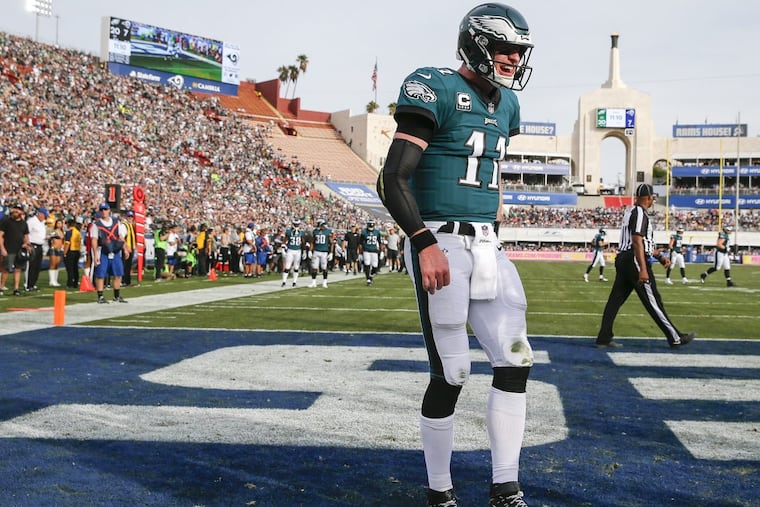Carson Wentz's absence could reveal the warts that his presence disguised | David Murphy
Carson Wentz out with a torn ACL will give the Eagles an opportunity to evaluate this team without its MVP-caliber quarterback who seemingly elevates everyone around him.

One of the few benefits of Carson Wentz's knee injury is that it will give the Eagles a chance to take an honest assessment of the team they have built around their young star. If you consider that a dubious interpretation of the word "benefit," I won't argue, but the fact remains that the next few weeks will offer the Eagles an opportunity to gain some level of information that they were unable to access while playing with a MVP-caliber quarterback who was capable of making everybody around him look better than they may or may not have been. It's debatable whether this information can play an actionable role in the front office's attempt to improve Wentz's supporting cast for future seasons. At the very least, though, it should make for an interesting study.
One of the unintended consequences of getting the quarterback position so right is the sense of contentment it can engender in those responsible for building the roster. During the peak years of the Andy Reid era, we saw this psychological bias manifest itself in the form of Big Red's refusal/inability to address the wide receiver position in a meaningful way. Part of me suspects that the Alshon Jeffery signing was, at least in part, an acknowledgment by Jeffery Lurie that the team had erred in neglecting to give Donovan McNabb a legitimate No. 1 receiver during the first half of his career.
In terms of present-day examples, the Colts are both the most glaring and the most pertinent, a cautionary tale of what can happen when a team misinterprets the dramatic improvement it experiences when a young superstar quarterback first takes the helm. Although Ryan Grigson did not help himself with a series of poor drafts (reaching for Phillip Dorsett and Bjoern Werner in the first round, for example), Andrew Luck's 11-5 rookie season also seemed to usher in an era of foolish win-now decisions, from trading a first-round pick for running back Trent Richardson, to spending big free-agent money on defensive tackle bust Art Jones, all the while neglecting to provide his young star with the pass and run-blocking he needed to succeed (and, it turns out, to stay healthy).
No doubt, some of Grigson's failings could have been attributable to a general manager being bad at evaluating talent. But it's also quite possible — even likely — that some of the problem lay in a general manager being bad at evaluating his home team. When a quarterback stinks, it isn't difficult to see the things around him that need to improve. But when a quarterback is playing at the level that Luck was in his first three years in the league, it can mask a lot of the areas where a roster can stand to improve. That's the level that Wentz was playing at this season. As good as Nick Foles was in 2013, he never came close to that level. We're about to find out what kind of Wentz premium to factor into everybody's performance.
The most obvious example of this might be the head coach. Bill Belichick, for example, has won 14 of the 20 games the Patriots have played without Tom Brady since 2002. But there are plenty of others, and it shouldn't surprise anybody if the most significant ends up being the offensive line.
Only six teams in the NFL have allowed more hits to the quarterback than the Eagles' 87, and the real interesting part of that fact is that those six teams have a combined record of 24-54, with only the Seahawks above .500. While the statistic in question doesn't do much to tell us about the overall performance of an offensive line, it is fair to wonder about the extent to which a mobile quarterback with a strong arm and excellent field awareness can mitigate protection breakdowns. And it is fair to wonder what those breakdowns might look like if that quarterback suddenly departs for a slower footed variety.
But Wentz's impact goes far beyond his ability to elude would-be tacklers and turn would-be sacks into more positive outcomes. So much of what the Eagles do on a schematic basis derive fromWentz's unique combination of strengths: their ability to move the pocket, to freeze pass-rushers and isolate receivers via mis-direction, etc. The same is true of the things that defenses are forced to do. It's hard to load up the box against a quarterback who can pick apart single coverage. Wentz's arm strength, vision and aggressiveness forces defense to guard every inch and angle of the field.
On Thursday, the talk in the locker room was the same as it has been since the news of Wentz's ACL tear first struck. The wide receivers say nothing is going to change on their end. Same goes for the running backs. On the offensive line, each man is still responsible for his assignment. From a broader view, though, Wentz's absence can't help but affect what the Eagles do as an offensive whole.
"It certainly seems like, throughout practice, we have our offense and we're going to run our offense," center Jason Kelce said. "Nick can throw on the run and do stuff like that as well. I don't know how much that is going to change."
The finding-out process will begin on Sunday.